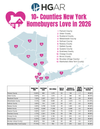ALBANY—New York Gov. Andrew Cuomo announced on May 25 that the state’s $2.7 billion emergency rental assistance program for struggling New Yorkers impacted by the COVID-19 pandemic will begin on June 1 when applications for funding will first be accepted.
He also announced that online applications for $800-millon in small business recovery grants will be accepted beginning on June 10.
“New Yorkers and small businesses in every corner of the state were devastated by the pandemic, and as we continue to recover and rebuild we need to make sure they have the resources they need get back on their feet and succeed in a new, reimagined economy,” Gov. Cuomo said. “This critical funding will help ensure New Yorkers who are experiencing financial hardship through no fault of their own will not be thrown onto the streets, while also providing stability for small businesses so they can help play a role in New York’s economic resurgence.”
The rental assistance program makes up to $2.7 billion in emergency rental assistance available for struggling New Yorkers impacted by the COVID-19 pandemic. Applications for the program will be accepted for eligible New Yorkers who are behind on their rent and have suffered financial hardship due to COVID-19. Administered by the state Office of Temporary and Disability Assistance, the New York State Emergency Rental Assistance Program will provide assistance with up to 12 months of past-due rent, three months of prospective rental assistance and 12 months of utility arrears payments to eligible New Yorkers, regardless of immigration status. The program is expected to serve between 170,000 and 200,000 households.
The rental assistance program will assist households behind on their rent and that have experienced financial hardship, that are at risk of homelessness or housing instability and that earn at or below 80% of area median income.
During the first 30 days, the program will prioritize the unemployed, those with income at or below 50% of area median income and other vulnerable populations. After the first 30 days, applications will be processed on a first-come, first-served basis, as long as funds remain available. For more information, applicants and landlords should visit otda.ny.gov/erap.
Once approved, eligible households will receive up to 12 months of past due rent. Those eligible could also receive up to three months of additional rental assistance, if the household spends 30% or more of its gross monthly income on rent. The program also will provide up to 12 months of utility arrears for eligible applicants.
In addition to fiscal relief, ERAP will provide significant tenant protections. In order to receive assistance, the landlord must agree to waive any late fees due on past-due rent; and not increase the tenant’s monthly rent or evict them for one year, except in limited circumstances.
The program is funded by $2.6 billion in federal resources and $100 million of state funding and is structured to help the state and the local governments that received funds directly from the federal government to collaborate and coordinate their efforts, thereby leveraging resources, gaining efficiencies and preventing fraud.
The state’s OTDA is organizing an unprecedented effort to establish partnerships with local governments across the state to ensure that community-based organizations will provide outreach and direct application assistance in multiple languages to potential recipients. This effort will mobilize substantial resources in order to ensure tenants from all across the state are aware of ERAP and able to apply.
In addition, the agency will undertake fraud prevention efforts to identify unreported income and to prevent duplicate rental payments.
Seven communities that received funding for emergency rental assistance directly from the federal government opted to administer their own programs. Residents of the City of Rochester and Monroe County, the City of Yonkers, Onondaga County and the towns of Hempstead, Islip and Oyster Bay must apply with their local programs for emergency rental assistance and are ineligible for assistance from the state-administered Emergency Rental Assistance Program. The $2.7-billion program includes the $168 million provided directly to these localities.
The small business recovery grant program makes up to $800 million in funding available for small businesses to help them recover from the economic impact of the pandemic. Applications for the program will be accepted for small and micro businesses and small for-profit independent arts and cultural organizations to help them recover from the economic impact of the pandemic. Flexible grants up to $50,000 will be made available to eligible small businesses and can be used for operating expenses, including payroll, rent or mortgage payments, taxes, utilities, personal protective equipment, or other business expenses incurred during the pandemic. More than 330,000 small and micro businesses are potentially eligible for this program, including 57 percent of the state’s certified MWBEs, state officials said.
The small business recovery grant program will provide funding to small and micro businesses and small for-profit independent arts and cultural organizations to help them recover from the economic impact of the pandemic, with priority being given to socially and economically disadvantaged business owners, including minority- and women-owned business enterprises, service-disabled veteran-owned businesses and veteran-owned businesses, and businesses located in economically distressed communities.
Grants will be for a minimum award of $5,000 and a maximum award of $50,000 and will be calculated based on a New York State business’ annual gross receipts for 2019. Reimbursable COVID-19 related expenses must have been incurred between March 1, 2020 and April 1, 2021 and can include: payroll costs, commercial rent or mortgage payments for NYS-based property, payment of local property or school taxes ,insurance costs, utility costs, costs of personal protection equipment (PPE) necessary to protect worker and consumer health and safety, heating, ventilation, and air conditioning (HVAC) costs, other machinery or equipment costs and supplies and materials necessary for compliance with COVID-19 health and safety protocols.
ESD has created a website -NYSBusinessRecovery.ny.gov – to highlight the various resources available to support small businesses seeking pandemic relief. The website will be continuously updated as more details and funding information as it becomes available.
The ESD Board of Directors approved $10 million in technical assistance grants for New York’s statewide Entrepreneurship Assistance Centers and Small Business Development Centers to help small businesses and for-profit independent arts and cultural organizations secure COVID-related financial assistance and grants available through existing state and federal programs.
Gov. Cuomo also announced that starting Tuesday, May 25, phase two of the “Reimagine, Rebuild, Renew” campaign will launch to make small businesses and residents who have been financially impacted by the pandemic aware of the many relief and recovery programs that are available in New York State. Print ads will run in local community newspapers across the state and social media ads will be featured on Facebook and Linked in with additional digital video ads advertised across the Internet.








